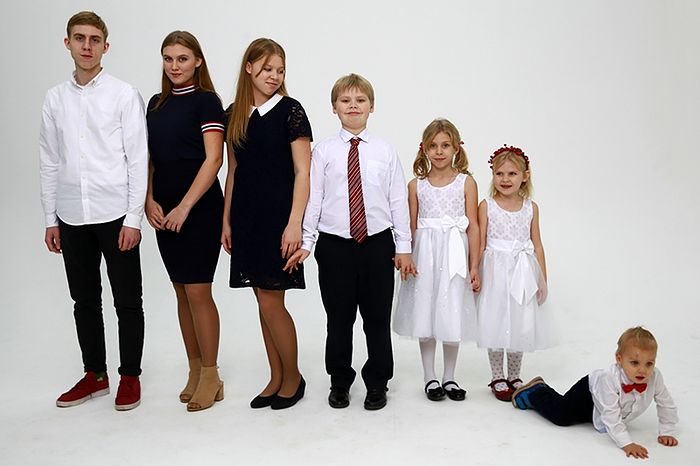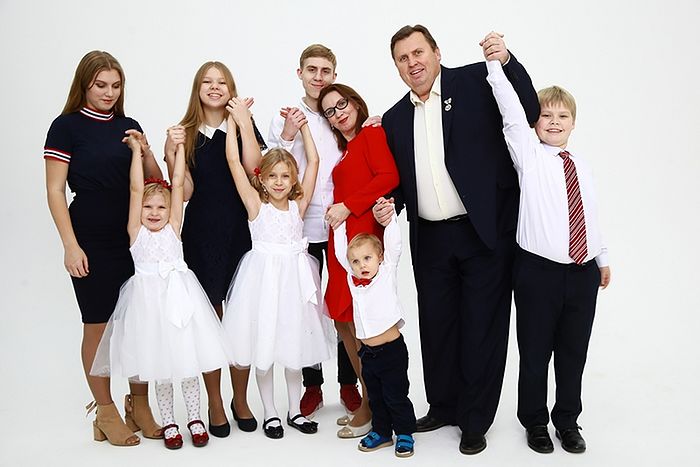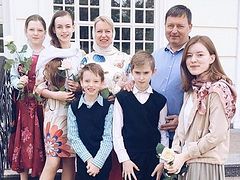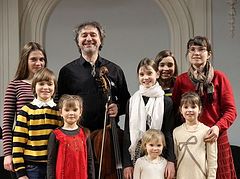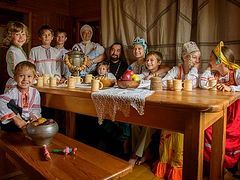Parents:
-
Andrei Viktorovich, fifty-four, a Hermitage Theater actor;
-
Tatiana Ivanovna, forty-four, a primary school teacher.
They have been married for twenty years.
Their children:
-
Ivan, nineteen, a second-year student of Moscow State Pedagogical University (the Chemestry Department);
-
Maria, sixteen, an eleventh grader;
-
Daria, fourteen, an eighth grader;
-
Gabriel, eleven, a fifth grader;
-
Nina, eight, a second grader;
-
Nadezhda, six;
-
Viktor, three.
Andrei Viktorovich speaks:
My spouse and I first met at work. Tatiana’s first profession is as an actress, so we worked at the same theater. For a year we were just friends, we would take walks and talk. A year later I understood that I couldn’t live without her.
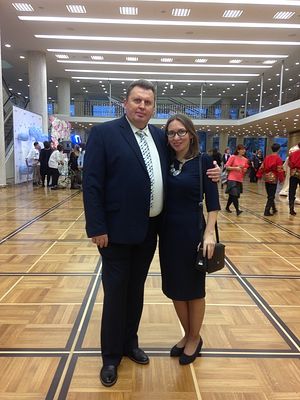 The Nagornov family The main thing that I treasure in my spouse is that she compliments me ideally. We understand each other without having to spell everything out, and she foresees many things in advance. Whenever she is not with me, I miss her very much. Tatiana possesses all the good qualities that you can only imagine. She is a very kind and responsible person, and she is able to love. We rarely have conflicts. But when we do have a conflict, we try to make concessions. True, it is hard, but a family always presupposes hard work. If you don’t work, there will be no family. Even if I know that I am right, I can try and find a compromise. And sometimes my wife is right and I am wrong—but we find a compromise anyway. Neither of the spouses should be superior to the other. A family is when both spouses are a continuation of each other, supplement each other.
The Nagornov family The main thing that I treasure in my spouse is that she compliments me ideally. We understand each other without having to spell everything out, and she foresees many things in advance. Whenever she is not with me, I miss her very much. Tatiana possesses all the good qualities that you can only imagine. She is a very kind and responsible person, and she is able to love. We rarely have conflicts. But when we do have a conflict, we try to make concessions. True, it is hard, but a family always presupposes hard work. If you don’t work, there will be no family. Even if I know that I am right, I can try and find a compromise. And sometimes my wife is right and I am wrong—but we find a compromise anyway. Neither of the spouses should be superior to the other. A family is when both spouses are a continuation of each other, supplement each other.
If we only abide by the principle, Let the wife fear her husband (cf. Eph. 5:33), there will be no family. The person I love, the weaker vessel (cf. 1 Pet. 3:7), is near me, and I should take good care of her. But in fact my wife treats me as “the weaker vessel” as well and cherishes me. We both try to protect each other. Perhaps that is why I feel as if we have been married for a year at most, while in reality we have been for twenty years. We recently sat down to recall the years we have spent together and agreed that the time has flown by in a flash: twenty years like one day.
When I married I couldn’t have imagined that I would become the father of a large family. My wife and I just love and have always loved each other. After the birth of our first child everybody told us: “Well, now you need a second one!” Then a daughter appeared, and everybody said: “Well, now just enjoy your life!” When the third baby was born we realized that our children had turned out so wonderfully that it would have been bad if we hadn’t had them. And if we hadn’t had even one of our seven children, it would have been much worse.
A life with children can never be easy. And it can be difficult to manage even one child—in all respects. Everyone is interested in finance: we try to organize our family budget so we have enough money to get all we need. And we succeed. We spend our vacations at the seaside together. Our friends often give us children’s clothes, though we buy some ourselves too: it gives our children joy to go to the shop and choose something according to their taste. I cannot agree with the opinion that you need heaps of money to stand your children on their feet. You just need to allocate your money reasonably. Parents’ requirements play an important role too.
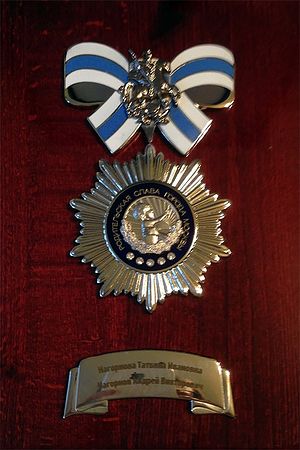 At present I am very pleased with what my oldest children have grown up into. My son Ivan did his best to study in a government-financed place at the institute; we don’t pay for his tuition. He does well in his studies; he is a kind and sensitive young man. True, there is his youthful enthusiasm, but we were like Ivan at his age. Such things end. Anyway his enthusiasm never goes over the top. For example, we have a summer cottage in the country, and Ivan is not enthusiastic about going there. I won’t force or try to persuade him; but if I ever need help there, he will be willing to go with me.
At present I am very pleased with what my oldest children have grown up into. My son Ivan did his best to study in a government-financed place at the institute; we don’t pay for his tuition. He does well in his studies; he is a kind and sensitive young man. True, there is his youthful enthusiasm, but we were like Ivan at his age. Such things end. Anyway his enthusiasm never goes over the top. For example, we have a summer cottage in the country, and Ivan is not enthusiastic about going there. I won’t force or try to persuade him; but if I ever need help there, he will be willing to go with me.
Parents shouldn’t force their children to do anything. It is an act of violence to someone’s freewill. You can try to persuade children, speak with them, and show them how to act by your example. Coercive methods don’t work. It would be enough for parents to bring up the oldest children properly, and the youngest will follow their example. Looking at the eldest, the babies “soak everything up like sponges”.
The interests of our children vary, but I cannot devote my attention to each one of them separately. Will six persons really wait, while I am busy with the seventh one? There are some kinds of pastimes which suit everyone: for example, we play board games together in the evening during vacations. Our children are also very fond of preparing home performances. They compose plays, rehearse, dress up and perform unassisted. Sometimes they even draw invitation cards themselves too. Then they seat us on the sofa and a performance begins. That is very enthralling and funny when even those who have no part in the play join in.
We have our own beehives in the garden. The children enjoy watching the bees. This year they had an exciting event and festive occasion when we took out honey. Such moments remain in your memory forever.
It’s a pity that our grannies and one grandad (my spouse’s father) are now gone. Only my father who is eighty is still with us. He has as many as eleven grandchildren (my children and those of my brother) and he says he is the happiest grandfather in the world. Many grandchildren make you happy.
Tatiana Ivanovna speaks:
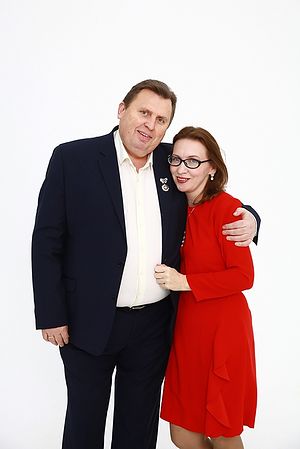 Andrei and Tatiana Nagornov I wanted to have a large family from childhood. Whenever I was watching the Russian movie, “Once, Twenty Years Later”, I thought that I wanted to have as many children as they had. I always felt the lack of a large family. My brother is seventeen years my senior, so it can be said that I grew up alone under my parents’ wing and suffered much because of this. I gave birth to our first child soon after I had started integrating into the Church life; so the idea that women should give birth to all children that God sends to them was very relevant to me. I asked my husband for his opinion and he said he would support me in this, though before the wedding he had not been very enthusiastic about having even one child.
Andrei and Tatiana Nagornov I wanted to have a large family from childhood. Whenever I was watching the Russian movie, “Once, Twenty Years Later”, I thought that I wanted to have as many children as they had. I always felt the lack of a large family. My brother is seventeen years my senior, so it can be said that I grew up alone under my parents’ wing and suffered much because of this. I gave birth to our first child soon after I had started integrating into the Church life; so the idea that women should give birth to all children that God sends to them was very relevant to me. I asked my husband for his opinion and he said he would support me in this, though before the wedding he had not been very enthusiastic about having even one child.
Andrei and I dated for about a year, but it was not a romantic relationship—we were just friends. After work we would stroll together and chat. I felt as if Andrei was courting me, but I had different plans, mainly creative ones. I was very interested in the acting profession back then. It lasted from autumn till next spring. I lived at the opposite end of town, so he would see me home every time. Andrei would accompany me as far as the entrance of my apartment block and then walk back home. And one evening we had an argument near my block, and I almost left. But he just kept standing there. I turned around, and it dawned on me that though we had been friends for a whole year, this man had not once hurt me or said any hurtful word to me. I had not seen anything bad in him but had seen only good. And at that very instant I fell for him. It happened in a heartbeat, in a single moment. I realized that I wanted to marry Andrei and have children with him. So I went up to him and said: “Alright! Let’s go to the cafe.”
And life has confirmed that Andrei is a very kind and responsive man. He is the kind of person who is ready to share his last penny and give disinterested help to everybody. My husband doubtless treats me as “the weaker vessel”. He never demands my obedience, but I have in fact gotten my own way on several occasions, and each time it turned out that my husband was right. And I would realize that I should have obeyed him. For some time I even thought that the Lord was showing me that I ought to obey my other half and have no other alternatives. But as the years went by, I became aware that one should not lose his or her personality, and that having and expressing your own opinion is good. Fortunately, my husband has never been too hard on me. We are able to reach an agreement, and Andrei often meets me halfway. When it became unbearable for me to stay at home any longer and I wanted to go out to work, my husband supported me and took it on himself to take care of the children. I felt that my development had stopped and that it was time for me to get back to people. And my husband gave me the opportunity to get a new profession (it was a special evening education) and then to have a full-fledged job at school. We registered our home kindergarten. Thus my husband (and not me) became a kindergarten teacher. He was with children in the day time, while I was at work; then I would return, and Andrei would go to work in the theater. It was convenient, as our schedules didn’t overlap. Whenever Andrei had an early rehearsal or film shoot, we had a nanny to replace him. School is a place that requires full devotion, and it is thanks to my husband that I have worked there for five years now. On one occasion I had a maternity leave (which lasted less than a year), when our youngest son appeared.
When a conflict arises (though it rarely takes place), it is better to wait till you calm down and overcome the resentment. Of course, at first I think that I am right and I will never forgive him, so let him come first and seek my forgiveness. But in most cases I ask his forgiveness anyway. It seems I do it more often than he does. Once the feelings of resentment have abated, I understand that peace in the family is far more important than our discord; I can “take an insult” and ask my husband’s forgiveness to restore peace in the family. The same is with our children—though I am an emotional person, I am unable to bear a grudge for long. I easily admit my faults. I can even admit to being in the wrong when I consider myself to be right.
Hierarchy in families is important. I don’t dispute that the husband is the head of the family and I forbid the children to dispute that. Our family is not a child-centered one; in our home the dad and mom come first, and then the children follow. And that is correct because children feel good when their parents feel good. I understood this judging by our family experience. Parents should be happy—then the feeling of happiness will be communicated to their offspring. We spend a lot of time with our children and find it very interesting; but if my husband and I go out for a while to relax, leaving the older children to look after the younger ones, it won’t lie heavy on my conscience.
In our family, parental authority is maintained by itself, at least by virtue of the children’s financial dependence on us. Our oldest son has a pretty bad temper because he was the only child in the family for quite a long time. Then all of his grandparents were still alive; for some time he knew what it means to be “the center of the universe”. Everybody doted up on him, so for many years he was an egoist and having so many siblings naturally made him angry. He was beside himself; as he grew up he regarded himself as the one and only child and thought that “the world revolved around him”. But now that Ivan is a young adult we see that our large family has molded his character in a different way. It has happened as if by itself—he has begun to show his respect for us and our way of life.
It happens that our children argue sometimes. Unless I am too tired, I can talk with them and give them some specific examples. But if I am tired, I can say in a commanding voice: “Stop immediately!” and then show them to their rooms and distract them with something. If I have no strength (for example, when I am sick), I can ignore a children’s conflict without interfering in it. After all, they are little ones who need to play with each other, so they will make peace sooner or later.
In my view, punishment can be used only as an exceptional measure. I can shut my eyes to many things, to virtually everything. But I consider stealing to be absolutely intolerable. Once we had the following incident: a boy egged one of our sons into taking his father’s money, after which there was a serious talking-to, and such things have never happened again. We never make our children stand in the corner. This makes no sense as they will walk away anyway. Both my husband and I have a very forgiving nature, and our children understand this easily. As a punishment we can take away some of their gadgets or forbid some kinds of entertainment for a while. Our children don’t try to make themselves a burden to us; and it is impossible to do it in a large family anyway.
The more children in the family the more independent they are. Now our youngest daughter is a second-grader and she learned how to cook at the age of five. She is passionate about the art of cooking. The older children look after the younger ones. We all tidy up the house together. We have no fixed responsibilities. Of course, sometimes the children play up: “I don’t want to do it! Why me?” We have to explain that it cannot be otherwise and we simply won’t manage without their help. And after playing up for a while they do their tasks anyway. Even if they don’t, they will be ashamed soon and try to make amends. A family is not a formal team. You live not so much according to the rules as by your emotions and moods. In the end love prevails, since we all love each other. Selfishness can surge up within each of us, but then we are ashamed.
It was much later that I understood that a woman should not neglect herself no matter how many children she has. Initially I would entirely give myself up to the children believing that bringing them up was the most important thing in my life. But then I began to feel very bad and I couldn’t figure out why. Today there is a fashion to speak about parental burn-out—that is, it’s like on the plane where you should put on your oxygen mask first and then the child’s… When my mother passed away I understood that what matters is not what kind of mother you have but just having a mother. Likewise, for my children my presence is already very good regardless of the time I devote to them. They have a mother as a model and they have my unconditional love. That is why I can spend as much time as I think necessary for my needs. Now I allow myself to go to the hairdresser’s or meet with my friends at the café. And I don’t have pangs of conscience anymore: “How is it I am not with my children?” Whatever I may do for myself I do it for my children. Because it is more important to the children to have a healthy and happy mom than a mom with a nervous breakdown.
Even if I were able to give everything to my children, it wouldn’t mean that they would take everything. While with my first children I thought it should be the best possible education, a music school, a sports school, and everything you can think of; now I will be happy if they just grow up into good and decent people. A long life is ahead of them; they will have time to make up for the things that I may have not given them in their childhood. An upright person is sure to find his place in the world. I personally didn’t find my calling until thirty-five. With four small children I went to study at the teachers’ training institute and I felt that I was the right person in the right place. As for theater, it was just a hobby.
What am I expecting from life now? I am expecting a baby.


